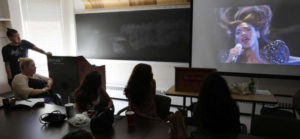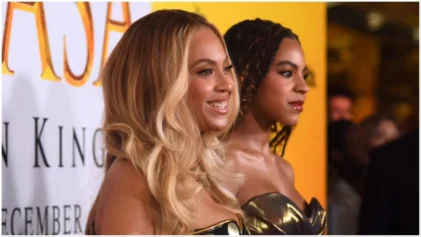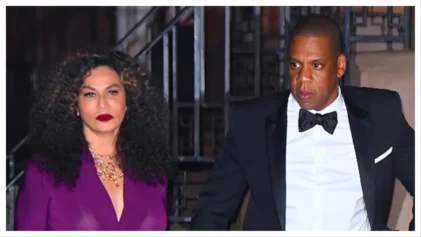
For what looks at first glance like just a fun undergraduate class at Rutgers University on the reigning queen of pop, his students sure were going above and Beyonce.
As Kanye West rapped in the background, Allred began discussing his latest album, Yeezus, comparing it with My Beautiful Dark Twisted Fantasy.
Feminist Perspectives: Politicizing Beyonce had begun.
The five-week, standard three-credit undergraduate class is a starting point, Allred said, for introducing students to identity politics and Black feminism, using an entry point they are already familiar with: Queen Bey.
Allred, a graduate student and adjunct lecturer in the women’s and gender studies department, showed a video of Holiday singing Strange Fruit.
“She’s not just singing, right? You can see her swallow some of the vocals and grimace at different points,” said Allred, 33. “This song is specifically political because it’s about lynching. But what else about Billie Holiday is important?”
Faith Henderson, 22, responded that the artist’s lyrics can become loaded with additional, even opposing, meanings.
“It gives it a whole new meaning,” she said of Holiday’s singing techniques and performances. Holiday’s love songs, she said, do not always come off as such: “She sounds like she doesn’t want the man to come back, even though the lyrics say she wants him to come back.”
It was just what Allred was looking for, and he transitioned to Beyonce’s video Mine, which included a shot of her naked back, the word “MINE” across it, arms wrapped around herself.
“She’s property, not herself,” Henderson said.
“Possession of herself,” said Elijah Agustin, 18. “But also, most love songs are about a girl who’s the guy’s girl — but in this video, all the guys were ‘yours.’ ”
For years, Allred taught classes where he would use Beyonce and other pop culture figures to help introduce concepts.
“It was always a hit because they could relate to it; they knew the music; they knew who she was,” he said. “I just thought about how opening up to all of her music and career, how could she be seen as a figure around all these questions: How do we understand gender and sexuality and race and class through her music?”
But Beyonce is just the starting point for the class, not its whole focus, he said.
“It’s really a class about Black feminism and the politics of race and gender and sexuality in the U.S. today, just using her music to get at those themes,” he said.
Class readings are all written by Black female authors and provide an overview of black feminist history in the United States. One class was themed Limits of Heterosexuality and Gender. The readings were paired with Beyonce songs: If I Were a Boy, Broken-Hearted Girl, Irreplaceable, XO, Love on Top.
“I don’t assign articles about Beyonce. It’s really stuff about black feminism and different struggles throughout history,” Allred said, “and then, how can we see these either being replayed through Beyonce’s music or contemporary society? Or does she challenge some of these? Does she extend some of these?”
Read the full story at articles.philly.com


